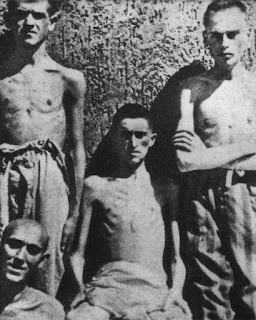In 1940, a ‘furtive delicate man,
with a pencil moustache and darting grey eyes’* was arrested in Jersey for a
minor fraud. Unfortunately for him, Jersey then was under German occupation and
an anti German leaflet was found in his possession. A further month was added
to his six-month sentence. The unlucky man was Charles, Anthony Faramus, former
hairdresser and dishwasher and barely twenty years old. In Ben Macintyre’s
words: ‘…tall and slender, he looked as though a puff of wind might blow him
away.’*
His luck took a turn for the worse
when, in prison, he hooked up with one Eddy Chapman, a wily adventurer and
crook. Chapman persuaded Faramus that the best, indeed only way to escape
German occupied Jersey was to offer themselves as ‘spies’ for the Germans. A
letter was duly sent to the German governor of Jersey and apparently ignored, until one night there was a
thunderous knocking on their door in the small hours of the morning. The
Gestapo, more suspicious than impressed, arrested them and whisked them to
France. Eventually the Germans decided that a tough and resourceful crook
would, with the right training might prove a useful agent. They had no use for a shy hairdresser and and Faramus was left in his cell to rot.
Before seeing him for what may have been for the last time, Chapman urged Faramus to trust him, and that whatever happened he would somehow protect
his friend from further harm.
They were empty words. Chapman
might well have thought he could negotiate Faramus’s safety in exchange for
what he was offering the Germans. The Germans saw things differently. Faramus
would be a pawn for Chapman’s good
behaviour – a fictitious pawn for—unknown to Chapman, Faramus was promptly
removed to Buchenwald concentration camp, where things went from bad to worse.
Failing to see an approaching Warrant Officer and removing his cap in time, he
was sent to Mathausen-Gusen, a concentration camp for the ‘incorrigible.’
There, inmates were worked until they dropped dead.
Somehow this delicate man with the
pencil thin moustache survived, but only just. In May 1945 the 41st U.S.
Cavalry liberated Mathausen-Gusen concentration camp and found, amongst an army
of ‘emaciated ghosts,’ Anthony Faramus, his body traumatised by diphtheria,
scarlet fever, gangrene and dysentery. He’d lost seven ribs and one of his
lungs, which he eventually lost, was riddled with TB.
Faramus was nursed in an RAF hospital
and released with £16 and a weekly stipend of £2. But Anthony Faramus was not
yet done with life. He became a film extra, and with exquisite irony, played
minor roles in war films such as Colditz and King Rat. Then he emigrated to
America and became a butler — to Clark Gable.
Faramus eventually returned to
Britain where, despite having only lung he became an active hunt saboteur,
eventually dying in 1990 aged seventy.
What happened to the even more
remarkable Eddy Chapman? I suggest you read Agent Zigzag by Ben Macintyre,*
which I strongly recommend.


2 comments:
Chapman was one strong son of a gun. What a rough life.
You had me going for a while. I'm not used to you posting this early in the week.
Still trying to catch up with myself :) Faramus had one hell of a tough life, but Eddy Chapman had the more interesting. It's quite cheap on Kindle, and I suspect both you and Greg would love 'Agent Zig Zag.'
Will try and post normally again, next week.
Post a Comment